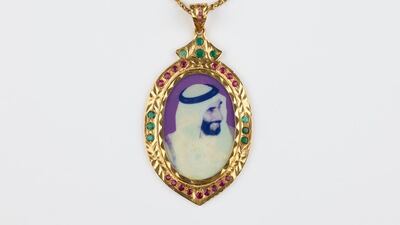Adornment – the enhancement of one’s appearance through garments, jewellery, weapons, attributes, grooming and perfuming, etc – is a deep-rooted tradition in cultural, societal and religious groups around the world. It can signify many things, including economic status, profession, religious beliefs, educational level, nationality and aesthetic sensibility.
In an exhibition that opened at Warehouse421 on Saturday, and closes on August 27, the wide-ranging significance of adornment in Emirati culture is explored in an original and compelling way.
It shows how this universal inclination to adorn is expressed in a truly Emirati manner through heirloom and patriotic jewellery, Bedouin weapons, burqa, garments, henna, khol and perfumes.
As an Emirati woman, the process of adornment has important meaning to me when I recall both ordinary and celebratory occasions. As a girl I remember admiring my mother wearing traditional attire and jewellery for family weddings and Eid Al Fitr and Eid Al Adha.
Working on this exhibition, I realise how deeply connected I am with other Emirati families through shared memories and experiences around adornment, past and present.
The Lest We Forget: Emirati Adornment: Tangible & Intangible exhibition, supported by the Salama bint Hamdan Al Nahyan Foundation, is special to me because it explores the richness of tangible and intangible Emirati culture through modes of adornment on a personal level. The exhibition aims to collect authentic archival material and showcase artistic work created by emerging Emirati artists based on the Lest We Forget Archive. Designed to explore cultural heritage through vernacular memories, the book and exhibition examine who we are and where we came from, as well as valuable knowledge and skills that have been passed down from generation to generation.
Through a display of diverse objects brought to life by memories and reflections, the exhibition is thought-provoking. It sheds light on the identity of the people who created, wore and shared these precious, personal, tangible and intangible forms of adornment.
When heritage such as this is gathered and seen as a whole in the exhibition and book, one comes to understand and appreciate the complexity and beauty of Emirati adornment. To me, it is both profound and inspiring, as it highlights the importance of passing down cultural heritage from generation to generation in order to keep our traditions alive.
I am so proud to see the Salama bint Hamdan Al Nahyan Foundation supporting grassroots initiatives like Lest We Forget, as together we are able to forge new and exciting ways to keep Emirati culture alive and accessible to all generations.
Echoing the foundation’s principle that knowledge and culture build bridges to understanding, it is also significant that initiatives such as Lest We Forget allow the Emirati community to share our rich culture with the broad range of nationalities who call the UAE their home.
It is these cultural bridges that both bind and strengthen us as a “united” nation, and it is these strong values of humility, respect and a shared sense of pride that ultimately lead to greater cultural understanding around the world.
I firmly believe that our culture is here to be shared. We welcome people of all ages, nationalities and cultures from across the Emirates to visit the exhibition, to share in our endeavour of passing on knowledge of Emirati culture, and to ultimately reflect on the shared society that we live in today.
Safiya Al Maskari is the project coordinator of the Lest We Forget initiative. Visit www.warehouse421.ae for details.
If you have a good story to tell or an interesting issue to debate, contact Amanda Tomlinson on atomlinson@thenational.ae.

